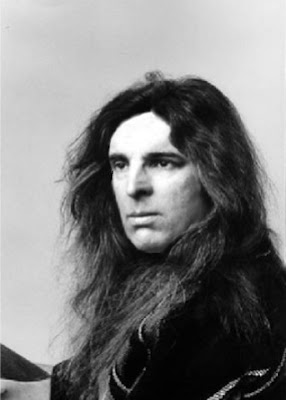
St. Jorie Yeats
Patron Saint of Meaningful Form
***
Patron Saint of Meaningful Form
***
First, to anyone who might have stumbled across this blog while Googling "Dylan Thomas" or the title poem (or something else):
Welcome.
I know this isn't what you were really looking for, but I get at least half a dozen of you accidental readers every week, so I hope you keep reading and find something interesting. Especially since I have, like, three or four readers otherwise. (Welcome to you too, my intrepid three or four.)
***
So, last month some other poet-bloggers did the "poem-a-day" thing, where they wrote a new draft every day and posted it to their blogs.
I'm not going to do that; my poem-maker doesn't work on the "daily" setting, and I sure as hell wouldn't post my early drafts anyway—for your sake as well as mine.
However, the daily part does interest me, so I'm going to try posting little essay thingies every day, at least for the rest of May.
***
I've been thinking a lot lately about how I might change my poetry style a bit. I'm a little sick of the kind of poem I've been writing for a little while now. Even though I am a bit wary of the seemingly compulsive innovation—or faux-innovation, as it seems to me—that plagues a good chunk of contemporary poetry, I would like to arrive at a form that somehow better matches my content.
But how many viable ways are there, really, to handle poetic form? Back in the days when traditional metrics ruled the roost, it was easy to come up with flashy ways to disrupt the tradition. Now, what's left to disrupt? Bruce Lee once said something like, "All the different martial arts styles are conditioned by the basic limitations of human anatomy. A human being has two arms and two legs, and there are really just so many ways one can realistically and effectively use them in combat." Beyond a certain point, one might just be waving one's arms around.
What can I do to my sentences and lines and etc., to enliven my poems without lapsing into nonsense? My primary exemplar in this project is Jorie Graham. I admire the way she warped poetry to match her own intellectual and emotional preoccupations. The stylistic moves she's made are not at all arbitrary; they have everything to do with her philosophical investigations into the relationship between self and world. Like them or not, one must admit that her styles are perfect expressions of her personal cultural experience. (As far as I can tell from reading her biography, anyway.)
She started off writing much more conventionally, then took off in a new direction. How can I make that leap? What style fits my weird little blend of Eastern mysticism and philosophy and depth psychology and etc.? I feel like this should come naturally, but when I write, my thoughts dribble out in the same old form. Thus, I have to take the poetics bull by the horns and conceptualize a new style, at least to the point of having a working, provisional model to try out.
Another poet who interests me a great deal these days is W.B. Yeats. His way of including myth and esoteric religious material in poems about everyday life appeals to me, as does his attention to language. In some ways, I think my overall poetic project is very similar to his. At any rate, I love how densely packed his poems are, and how pleasing on every level—discursive, sonic, imagistic.
What I want is to come to some happy medium between the kinds of writing epitomized by these two poets. One problem with a lot of poets who open up their form (Graham included to a slight extent, though MUCH less so than her imitators) is that the language gets slack and the poem gets bland and boring. I want to keep my poems densely packed like Yeats's, but also formally inventive and fresh like Graham's. I want to be a perfect hybrid of Yeats and Graham—or, more accurately, of the different kinds of projects they symbolize for me. Hence, St. Jorie Yeats:

So my job is to study Graham and infuse her Jorie-consciousness into my own soul. But I don't want the new poems to be all about the new form. There's a lot of formal innovation out there these days, but much of it seems to me just as arbitrary and unrelated to the poem's content (and poet's psyche) as is any more conventional, traditional form. I don't want to be one of the "Look at me! I've abandoned left alignment!" type of poets, or a member of the "I'm confused, so you should be, too" school. Even Graham painted herself into somewhat of a corner by putting all her eggs in the "formal innovation" basket, so that with every book she had to find a new way to top herself. Perhaps because she hit the wall with Swarm, her books since then have been increasingly less "out there." I want to freshen my form without the form being the point.
And I want to enjoy the writing. There will be joy.
Easy to say, hard to do. I will pray to St. Jorie Yeats for a vision of my poems to be.
No comments:
Post a Comment